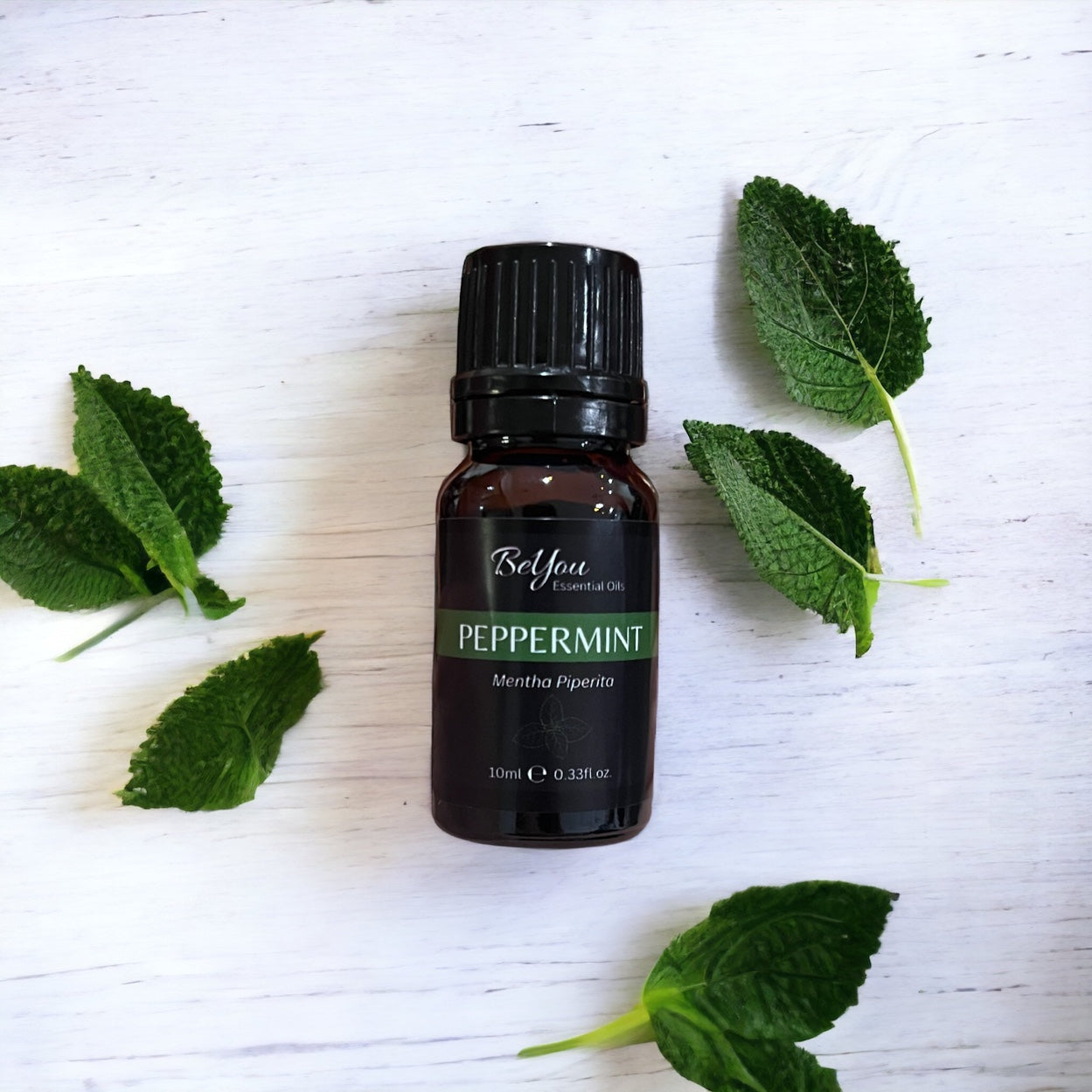Peppermint Pure Essential Oil
Peppermint Pure Essential Oil
Low stock: 2 left
Couldn't load pickup availability
DESCRIPTION
DESCRIPTION
Peppermint Essential Oil is a versatile and popular oil known for its invigorating aroma and numerous therapeutic benefits. Here's a description highlighting its benefits, usage, blending options, and safety precautions:
Benefits:
- Refreshing and Energizing: Peppermint oil has a cooling sensation that can uplift your mood, boost energy levels, and promote mental clarity and focus.
- Digestive Support: Peppermint oil has soothing properties that can help relax the muscles of the gastrointestinal tract, relieve spasms, and reduce symptoms such as bloating, gas, and indigestion.
- Respiratory Relief: Peppermint oil can provide relief from congestion, sinusitis, and respiratory issues due to its expectorant properties.
- Headache Relief: It may help ease tension headaches and migraines when applied topically to the temples or forehead.
- Natural Insect Repellent: Peppermint oil has a strong scent that deters insects and can be used as a natural alternative to chemical repellents.
- Antimicrobial Properties: Peppermint Essential Oil is known for its antimicrobial properties. It contains natural compounds, particularly menthol and menthone, which have inhibitory effects on various types of bacteria, fungi, and even some viruses. This makes it a popular choice for natural cleaning products, as well as for addressing certain skin conditions and promoting oral health.
PRODUCT DETAILS
PRODUCT DETAILS
Botanical Name: Mentha Piperita (Peppermint) Oil
Derived from: Leaves
Origin: USA
Extraction: Steam Distilled Essential Oil
Note: Top note
Aroma: Minty, cool, fresh, herbaceous
- Vegan
- Non-GMO
- Not tested on animals
- Halal
- No carrier oils, 100% pure essential oil
Size: 10ml
DIRECTIONS FOR USE
DIRECTIONS FOR USE
Usage:
- Aromatherapy: Add a few drops of Peppermint oil to a diffuser to enjoy its refreshing aroma and promote a sense of clarity and alertness.
- Topical Application: Dilute Peppermint oil with a carrier oil (such as coconut or almond oil) before applying it to the skin. It can be used for massage, targeting sore muscles, or to provide a cooling effect.
- Inhalation: Inhale Peppermint oil directly from the bottle or by adding a few drops to a tissue or inhaler for quick relief from congestion or nausea.
- DIY Products: Peppermint oil can be added to homemade cleaning products, soaps, shampoos, and lotions to add a fresh scent and potential antimicrobial properties.
- Digestive Support: Inhalation: Add a few drops of sweet orange essential oil to a diffuser or inhale directly from the bottle. Topical Application: Dilute a few drops of sweet orange essential oil in a carrier oil, such as coconut oil or jojoba oil. Gently massage the diluted mixture onto your abdomen in a clockwise direction. Internal Use (with caution): Add a drop of sweet orange oil to a glass of water or herbal tea and consume it. This can provide a gentle support for digestion and a refreshing flavor. Start with a small amount and gradually increase if needed.
BLENDS WITH
BLENDS WITH
Blends Well With:
Peppermint oil blends well with various essential oils, including:
- Eucalyptus: Enhances the respiratory benefits and creates a refreshing blend.
- Lavender: Combines for a soothing and calming aroma.
- Lemon: Creates an uplifting and invigorating blend.
- Rosemary: Adds an herbal note and complements the cooling properties.
SAFETY PRECAUTION
SAFETY PRECAUTION
Safety Precautions:
- Peppermint oil is generally safe for most individuals when used in moderation.
- It is recommended to dilute Peppermint oil before applying it topically to avoid skin irritation.
- Avoid contact with the eyes, mucous membranes, or sensitive areas of the body.
- Keep Peppermint oil out of reach of children.
- If you have specific health concerns, are pregnant, nursing, or taking medications, it's advisable to consult a healthcare professional before using Peppermint oil.

FAQs
-
What are essential oils?
Essential oils are highly concentrated plant extracts that capture the natural fragrance and beneficial properties of plants. They are typically obtained through processes like steam distillation or cold-pressing of various plant parts such as leaves, flowers, stems, or roots. Essential oils are known for their aromatic qualities and are commonly used in aromatherapy, personal care products, and natural remedies. -
How are essential oils used?
Essential oils can be used in several ways. Here are a few common methods:
- Aromatherapy: Inhalation of essential oils using diffusers, steam inhalation, or adding a few drops to a bowl of hot water.
- Topical application: Diluting essential oils with carrier oils (such as coconut or jojoba oil) and applying them to the skin for massage or skincare purposes.
- Internal consumption: Some essential oils are safe for internal use, but it is crucial to consult a qualified professional before ingesting them, as not all oils are suitable for internal consumption.
-
What are the potential benefits of essential oils?
Essential oils are believed to offer a range of potential benefits, but it's important to note that scientific research on their effectiveness is still evolving. Some commonly cited benefits include:
- Aromatherapy for relaxation, stress relief, and mood enhancement.
- Skin and hair care: Many essential oils are used in skincare products for their potential antimicrobial, anti-inflammatory, and soothing properties.
- Natural cleaning: Some essential oils possess antimicrobial properties and can be used as natural alternatives for household cleaning products.
- Potential respiratory support: Certain essential oils, such as eucalyptus or peppermint, are known for their potential respiratory benefits when inhaled.
-
Are there any risks or precautions associated with essential oils?
While essential oils are generally safe when used properly, there are a few important considerations:
- Skin sensitivity: Some essential oils can cause skin irritation or allergic reactions, especially when used undiluted or on sensitive skin. Always perform a patch test and dilute oils before applying them topically.
- Inhalation precautions: Not all essential oils are safe for inhalation, especially for individuals with respiratory conditions or sensitivities. Certain oils may trigger allergies or respiratory distress.
- Internal use: Internal consumption of essential oils should only be done under the guidance of a qualified professional. Many oils are toxic when ingested, and improper use can lead to adverse effects.
- Pregnancy and children: Some essential oils are not safe for use during pregnancy or on young children. It's crucial to consult healthcare professionals or certified aromatherapists for guidance in these situations.
Remember, it's always wise to consult with a healthcare professional or aromatherapist before using essential oils, especially if you have any underlying health conditions or concerns.
5. What is your extraction/collection process?
Refer to our Blogs for a detailed explanation about our Extraction and Collection process.
6. Are the plants sprayed with any chemicals which may lead to being included in the process of collecting the oil?
No, as our suppliers are certified there is no chemicals or pesticides being used on the plants, which are confirmed as each batch is analysed by microbiologist for the presents of bio-hazardous micro-organisms (such as bacteria and mould), heavy metals and pesticides.
7. Are the oils 100% organic as well as not diluted with fragrances or anything other than the plant itself?
Yes, all our Essential and Absolute oils are 100% organic, pure, with no carrier oils added, or fragrances.



